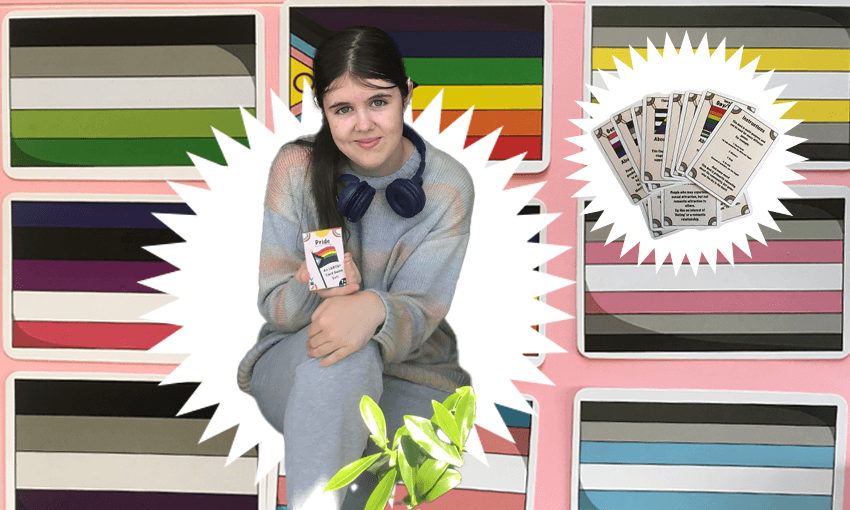Thanks to the Young Enterprise Scheme, one student has made a card game that could end up making a big difference for the young queer community, writes Sam Brooks.
New Zealand students wanting to make some extra cash aren’t doing paper runs or selling tickets at the cinema any more. With easy access to internet storefronts and international manufacturers, they’re able to create and run successful businesses from their bedrooms – no matter where in the country they’re based.
Seventeen-year-old Bless Groome lives in Hokitika on the West Coast, goes to Westland High School, and has created a business all about celebrating difference through a deck of cards called Pride. And she did it with the support of the Young Enterprise Scheme (YES), the long-running programme that gives year 12-13s real-world experience of founding and running their own business
Groome, who identifies as bisexual and aromantic, knew from the moment she was accepted onto YES that she wanted to create a business focused on supporting the LGBTQ community. She hoped her product could help young non cishet people – and their family and friends – better understand their identities. “If I had known that aromanticism was an option, it would’ve made my primary to intermediate life a lot easier,” she says. “That’s why I made Pride. So that I can provide that kind of clarity and teach about these things so people can get to know themselves sooner.”
Her Pride card deck aims to educate anybody over the age of eight about the LGBTQ community, gender identities, and the differences between romantic and sexual attractions. Cards have a flag on the back representing a sexuality or gender identity, and the information about the flag is on the other side. Pride can be used for learning or memorising what different flags represent, or used to play simple games like Memory or Snap. Twenty-five different flags are included, ranging from the more widely known lesbian and gay flags to less widely-used ones like the non-binary and genderfluid flags. Groome has also included te reo Māori translations where applicable.
While making a card deck is a new experience for Groome, she’d already founded an Etsy store selling LGBT-themed arts and crafts including masks during the pandemic, and says the experience of running the store gave her a headstart when it came to creating Pride.
Another big boost came from Gender Minorities Aotearoa, a nationwide organisation working for the trans community. They responded to an email from Groome requesting financial support by offering to fully sponsor her first run of cards, to the tune of $1000. “That definitely gave me a leg up in the competition,” says Groome. “I wouldn’t be where I am right now in the competition, or in my business, without their help back then.”
The Young Enterprise Scheme, run by Lion Foundation for 40 years, is an extra-curricular programme where students set up and run a real business, by creating a product or service to bring to the open market. The alumni of the programme include Shuari Naidoo, founder of Moraka menstrual cups, and Shay Wright, founder of the Māori social entrepreneurship startup Te Whare Hukahuka. The scheme involves five challenges over the year, essentially serving as school assignments, that follow the general structure of running a business: validating a project, pitching it to investors, promoting it, selling it, and then doing an annual review. Although Groome doesn’t get any credits from it, the programme serves as a class on her school timetable.
“You get to compete in pitch competitions, like Shark Tank style, where you go in front of a panel and have a certain amount of time to talk about what your product is,” she says. “If you do well on that, you get extra merit in the programme, which can give you a better chance to move onto the finals.”
The finals, in which Groome has secured a place, are this year offering a prize pool of $23,000. If she wins, she plans to use some of the money on university tuition to study graphic design at the University of Auckland, and the rest on expanding the scope of Pride to include more flags, identities, and potentially pronouns. She still has about 100 decks left to sell, though, which she needs to completely sell out to have a chance of making those finals.
While Groome has been mostly marketing Pride to schools so far, she’d like more people to have access to the cards. “I don’t want just kids playing with them,” she says. “I want families, adults, parents, maybe even grandparents if they’re open to it, to have access to this sort of thing so they can understand it.
“If they have a younger generation of their family who is a part of the community, then it can help them understand what it is, who they are, and what they’re going through without pushing too hard.”
You can purchase Pride here.
